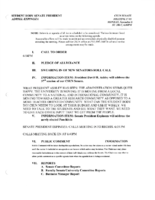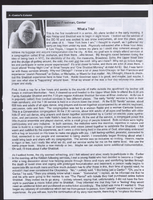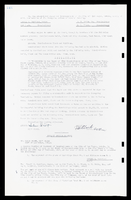Search the Special Collections and Archives Portal
Search Results
Nevada State Retired Teachers Association on the Book, Inside Nevada Schools: A Challenge for the Future
Identifier
Abstract
Nevada State Retired Teachers Association Collection on the book Inside Nevada Schools: A Challenge for the Future (1970-1976) contains the finished book and the research conducted for the completion of the project. Included are oral interviews, articles, notes, copies of photographs, and organizational plans.
Archival Collection
Las Vegas Hilton (International): Las Vegas, Nevada, 1976 December 15; 1981 July 23
Level of Description
Archival Collection
Collection Name: Homer Rissman Architectural Records
Box/Folder: N/A
Archival Component
Flamingo Hilton: Las Vegas, Nevada, 1975 November 4; 1993 November 12
Level of Description
Archival Collection
Collection Name: Homer Rissman Architectural Records
Box/Folder: N/A
Archival Component

Meeting minutes for Consolidated Student Senate, University of Nevada, Las Vegas, November 06, 2006
Date
Archival Collection
Description
Text
Dennis McBride oral history interviews
Identifier
Abstract
Oral history interviews with Dennis McBride conducted by Claytee D. White and Stefani Evans on various dates in March, April, and May 2023 for the Boyer Early Las Vegas Oral History Project. McBride goes into detail in this 4-session interview and covers a wide variety of topics, including: the history of Boulder City, working at various cultural institutions in Las Vegas, the evolution of the LGBTQ+ community in Las Vegas, researching his own history and publishing a book, and local advocacy groups. Digital audio available; no transcript available.
Archival Collection
Brian Greenspun oral history interviews
Identifier
Abstract
Oral history interviews with Brian Greenspun conducted by Barbara Tabach on January 10, 2018, January 24, 2018, February 21, 2018, and March 20, 2018 for the Southern Nevada Jewish Heritage Project. In the first interview, Greenspun discusses his parents, Hank and Barbara Greenspun, his family's ancestry, and how his family came to Las Vegas, Nevada. He recalls his childhood in Las Vegas, graduating from Las Vegas High School in 1964, and his decision to attend Georgetown University. In the second interview, Greenspun discusses the Watergate scandal, what he believes will fuel the next decade of Las Vegas growth, and development in the technology industry. He talks about the Greenspun Media Group, challenges in journalism, use of the term “fake news”, and the importance of giving young people a forum to talk about what they value. In the third interview, Greenspun recalls union demonstrations the Sands Hotel and Casino, the impact of American businessman Sheldon Adelson, and the need for balance in journalism. In the final interview, Greenspun talks about his father’s reporting on the Nevada Test Site, underground testing in the 1960s, and the early development of the Strip. Lastly, Greenspun talks about the importance of the University of Nevada, Las Vegas to the city’s future.
Archival Collection
Owen S. Bunker, Mary F. Botts Miller, LaRue and Richard Worthen, and Janice Zobrist oral history interview
Identifier
Abstract
Oral history interview with Owen S. Bunker, Mary F. Botts Miller, LaRue and Richard Worthen, and Janice Zobrist conducted by Claytee D. White and Karen Schank on June 12, 2010 for the Boyer Early Las Vegas Oral History Project. In this interview, participants discuss their relationship to the Old Mormon Fort in Las Vegas, Nevada. Miller talks about her family’s involvement at the Fort and remembers school integration. Richard and LaRue recall moving to Las Vegas in 1942 and describe the old Las Vegas creek. Bunker talks about his uncle’s involvement at the Fort raising hogs and cultivating fig trees, and remembers the Quinn Dairy Farms business. Lastly, Zobrist discusses growing up in Las Vegas and being a member of the Daughters of Utah Pioneers.
Archival Collection

Jill Roberts oral history interview: transcript
Date
Archival Collection
Description
Oral history interview with Jill Roberts conducted by Barbara Tabach and Claytee D. White on March 20, 2018 for the Remembering 1 October Oral History Project. In this interview, Jill Roberts discusses her position as the CEO of the Trauma Intervention Program (TIP) of Southern Nevada. She also delves into her part-time work at the coroner's office as a death investigator and discusses her personal background in Las Vegas, Nevada after she moved to the city in 1977. She describes the role TIP had during the aftermath of the October 1, 2017 mass shooting, where well-trained volunteers were dispatched to hotels, hospitals, and anywhere else the survivors reached in order to provide emotional and practical support. Throughout the interview, Roberts emphasizes that the assistance provided to those in a traumatic event depends on each individual's needs. She shares a few examples of what the TIP volunteers had helped with after the shooting, including listening to the survivors' stories as well as providing information on the situation, helping separated loved ones find each other, arranging travel for some survivors to go back to their homes, and procuring clothes and shoes for those who needed them. Roberts also discusses the gratitude TIP had received after the shooting, including the thank you cards sent by Sandy Hook High School.
Text


